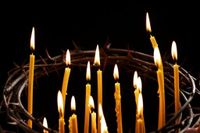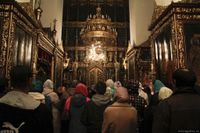Holy Week, a significant period in the Christian calendar, begins on April 14, 2025, and culminates in the celebration of Easter on April 20, 2025. This week is a time of deep reflection and spiritual preparation for believers as they commemorate the last days of Jesus Christ's life, including his suffering, crucifixion, and resurrection.
Holy Week, also known as Passion Week, is essential for Christians, marking a time dedicated to repentance, prayer, and purification. Each day of this week is referred to as "Great" and is associated with specific events in the life of Christ, offering believers a chance to deepen their faith through various traditions and practices.
Starting on Great Monday, the week unfolds with a series of spiritual observances. On this first day, believers reflect on the story of Joseph from the Old Testament, who was sold into slavery by his brothers, drawing parallels to the suffering of Christ. This day emphasizes the importance of repentance and the beginning of a renewed spiritual journey.
As the week progresses, Great Tuesday focuses on themes of forgiveness and charity. It is a day for believers to reconcile with those they may have conflicts with and to extend kindness to those in need. This spirit of mercy is crucial as Christians prepare their hearts for the solemn events ahead.
Great Wednesday is particularly poignant, as it commemorates the betrayal of Judas Iscariot, who sold Jesus for thirty pieces of silver. On this day, Christians reflect on their own lives, considering the themes of betrayal and forgiveness while seeking spiritual cleansing.
Great (Clean) Thursday is a day of remembrance for the Last Supper, where Jesus instituted the sacrament of communion. During church services, believers engage in prayers for spiritual nourishment and fidelity to Christ. This day is also marked by the tradition of foot washing, symbolizing humility and service.
Great (Passionate) Friday is the most somber day of Holy Week, as it commemorates the crucifixion of Jesus. It is a day of mourning, where believers observe a strict fast and engage in deep contemplation of Christ's suffering. Many refrain from any form of entertainment, focusing instead on prayer and reflection.
Following this, Great Saturday symbolizes the time Jesus spent in the tomb. It is a day of waiting and anticipation as Christians prepare for the joyous celebration of Easter. The evening of this day marks the Easter Vigil, where believers gather for a service that culminates in the celebration of the Resurrection.
Throughout Holy Week, various traditions and restrictions guide the faithful. During this time, believers are encouraged to pray more fervently and attend church services, especially on Great Friday and Easter Saturday. The week is characterized by fasting, with many choosing to consume only bread and water from Monday to Saturday, reflecting a commitment to spiritual discipline.
In addition to fasting, Holy Week traditions include the blessing of Easter cakes and eggs, which symbolize new life and resurrection. On the night of Easter, these foods are sanctified in church, marking the transition from the somber observance of Holy Week to the joyous celebration of Easter Sunday.
Restrictions during this week are strict. It is forbidden to consume meat and dairy products, participate in entertainment, and engage in any form of celebration. These guidelines are intended to foster an atmosphere of reflection and prayer, allowing believers to focus on the significance of the events being commemorated.
As Holy Week unfolds, each day brings its own significance and traditions. Great Monday, for instance, is dedicated to moral lessons about faith and action, reminding believers that faith must be accompanied by good deeds. Meanwhile, Great Tuesday encourages self-examination and kindness, as believers prepare for the judgment that awaits each individual.
Great Wednesday serves as a reminder of the importance of love and loyalty, contrasting the actions of the sinful woman who anointed Jesus with oil against Judas's betrayal. This day invites believers to reflect on their relationships and seek forgiveness where needed.
On Great Thursday, the focus shifts to the Last Supper, where Jesus shared his final meal with his disciples, emphasizing the importance of humility through the washing of feet. This day is also a time for believers to prepare their homes for Easter, engaging in cleaning and decorating activities.
Great Friday is a day of profound sorrow, as Christians remember the crucifixion. It is a time for deep spiritual reflection and mourning, with many choosing to fast completely. The day is marked by special church services that include the veneration of the Shroud, symbolizing Christ's burial.
Finally, Great Saturday concludes Holy Week as believers prepare for the joyous celebration of Easter. It is a time for final preparations, including the blessing of Easter foods and the anticipation of the Resurrection. As the clock strikes midnight on Easter Sunday, the atmosphere shifts from mourning to celebration, as Christians rejoice in the victory of life over death.
In summary, Holy Week is a time of deep spiritual significance for Christians around the world. It serves as a reminder of the sacrifices made by Jesus and provides an opportunity for believers to engage in reflection, repentance, and preparation for the joyous celebration of Easter. Through various traditions and observances, Christians seek to draw closer to their faith and commemorate the profound events of this sacred week.








